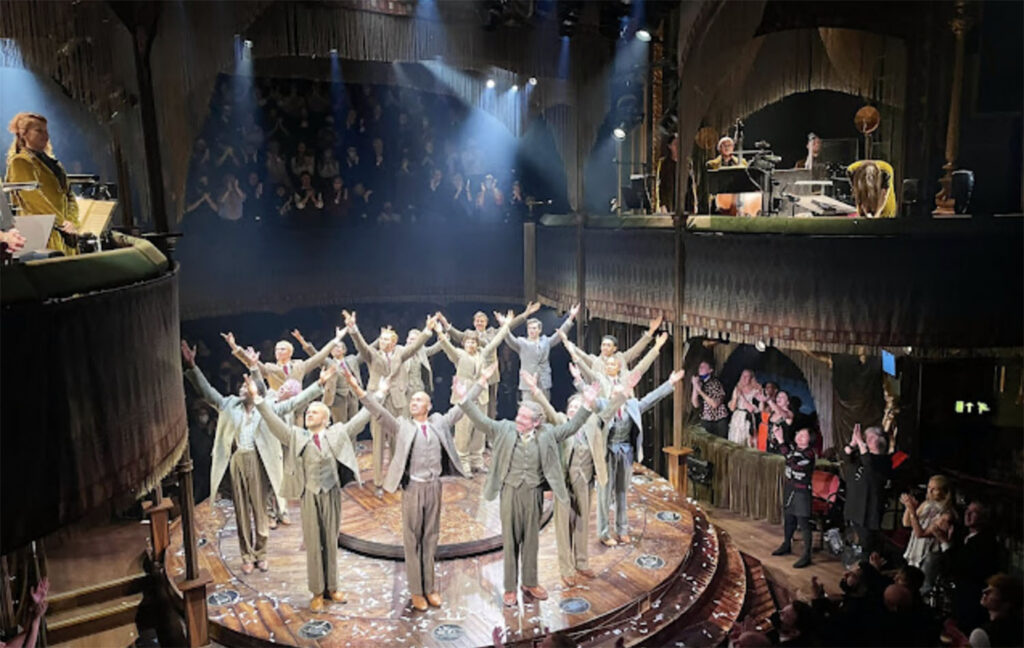By Alliance Intern Rachael Lee UT’ 25
I just saw the boisterously colorful, extravagant and sin- and sex-laden 60s iconic musical is back in this gender- and mind-bending spectacle updated to confront today’s audience with the extreme threat of our present slide to authoritarianism.
Don’t miss Billy Porter and Marisha Wallace star as “Emcee” and “Sally Bowles” directed by Rebecca Frecknall in the August Wilson Theatre’s fresh, poignant and all-too-relevant rendition of Cabaret from July 22 to October 19, 2025.
Based on the original semi-autobiographical The Berlin Stories by Christopher Isherwood, Cabaret was first performed in New York City at the Broadhurst Theatre on November 20, 1966. The Tony-awarded musical, which was the final product of composer John Kander and lyricist Fred Ebb, has been revived every decade since the 1970s.
Set in a seedy cabaret in the 1930s, Cabaret depicts the tale of two doomed romances and the rising threats of Nazism during the Weimar Republic. The musical centers on the relationships between Clifford (Cliff) Bradshaw, an American writer who travels to 1929 Berlin, and Sally Bowles, a local performer at the seedy Kit Kat Klub.
As their relationship progresses within the musical, another important relationship is developing in the shadows. Herr Schultz, a jewish grocer, wins over Fraulein Schneider, the owner of the boardinghouse Cliff is currently residing at.
Life is a Cabaret, My Friend
The musical swindles you throughout, delivering you deceptions of marriage, family, and true love, only to be overturned and shattered due to the rising threat of Nazism. And of course the singing and dancing of Porter and Wallace, along with the chorus, were over-the-top Broadway at its best.
Even more amazing, it was all contained within a literal cabaret stage setting, replete with some audience members seated at immersive cabaret tables and actors engaging with them.
Nazism is a totalitarian movement led by Adolf Hitler in Germany. An anti-intellectual and atheoretical (conforming with no basis) movement founded on one goal and one goal only: the annihilation of all enemies of the Aryan race that led to the death of millions of people who did not meet their pure white standards.
As I sat in the theatre, there were multiple moments when shivers flew down my spine. Cabaret reflected too many similarities to the current political climate, bringing back chilling reminders.
The Brilliance of the Cabaret Fades to Gray with the Rise of the Third Reich
At the beginning of the show, everyone has bright, individualized make-up and clothing. However, the cabaret gradually lost its color. As the cast became increasingly dull, I was disheartened and horrified as the cabaret began adopting the uniform of Nazis. It struck a deep, discordant chord inside me.
Through the final song, I realized the Broadway revival was sending a timely warning to the citizens of our own country. Today we are confronted with a world-changing choice. We can continue to indulge in our many immense privileges by simply conforming culturally and politically. Or we can remain our individualistic selves and face judgment, shunning and crackdowns as authoritarianism tightens its iron-clad grip on all aspects of our lives and democracy.
So, the next time you compartmentalize your feelings about the local political climate and carry on idly with your life, make sure to ask yourself: Is being an unwilling participant still contributing?


